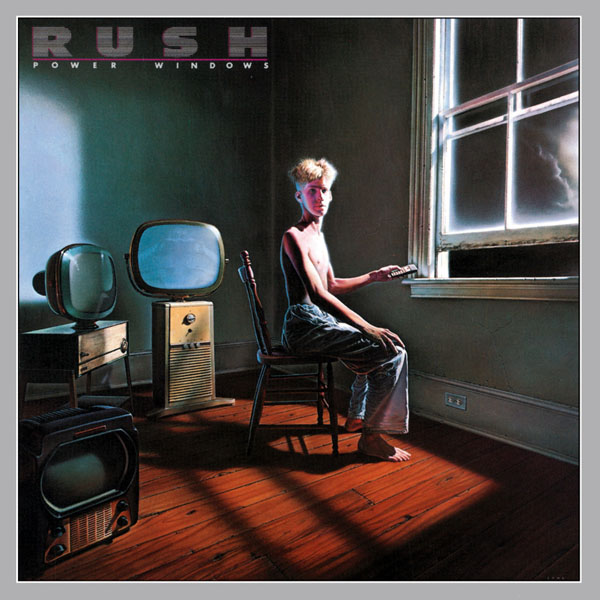Power Windows Album Review
By David Fricke, Rolling Stone, January 30, 1986, transcribed by Jimmy Lang/Meg Jahnke

While critics routinely dismissed Rush as pretentious operatic heavy-metal bozos, this indefatigable Canadian trio was actually busy becoming the Police of power rock. On their recent studio LPs, leading up to 1984's appropriately titled Grace under Pressure, they tightened up their sidelong suites and rhythmic abstractions into balled-up song fists, art-pop blasts of angular, slashing guitar, spatial keyboards and hyperpercussion, all resolved with forthright melodic sense.
"The Big Money," the first hot FM focus track from Power Windows, may be the best of Rush's Cool Wave experiments to date. Neil Peart whips up a Molotov drum cocktail that is half Stewart Copeland psycho-ska and half "Blitzkrieg Bop"; from deep within his Edge-like echo pit, guitarist Alex Lifeson opens fire with a metallic descending chord sequence that rips through the song's chrome-finish production like grapeshot. In "Territories," a simple disco-style pulse becomes a Lifeson-spurred gallop, his Chinese guitar chatter alternating with the telegraphic synth patterns and sheet-metal keyboards played by singer-bassist Geddy Lee.
To most U2 and Simple Minds fans, these may not seem like major advances. There are moments when Power Windows sounds too much like the sum of its Eighties inspirations — that ghostly U2 resonance, the Police-like mesh of multirhythms and ping-pong dub effects. Yet Rush, no doubt responding to familiar impulses, revs up these songs with brute metal force. Lifeson's solo in "Grand Designs" teeters on white noise, his demon strokes dissolving into feedback howls and strangled vibrato, while Peart and Lee subdivide the beat into frenzied algebra.
This is not a case of old Seventies arena-rock dogs fudging new tricks. Rush remains faithful to vintage progressive aesthetics but has accepted the challenge of the postpunk upheaval and made notable adjustments. "Manhattan Project" is the first song about the A-bomb that successfully combines Genesis-like grandeur, real strings and a breakaway middle à la Siouxsie and the Banshees at full throttle. Lee has also toned down his keening shriek to a more accessible tenor; Peart, the group's uncompromising lyricist, has streamlined his verse to pithy effect.
None of this is likely to impress the New Wave in crowd, which is their loss. Because Power Windows may well be the missing link between Yes and the Sex Pistols.